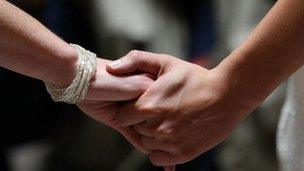Opinion group votes in favour of gay marriage in Ireland
- Published

The convention has voted in favour of gay marriage in Ireland. The government must now decide whether to accept the recommendation.
The Irish constitution should be changed to allow for civil marriage for same-sex couples in Ireland, according to a public opinion group.
The constitutional convention was established by the government to examine proposed changes to the Irish constitution.
The vote was 79% in favour and 18% against, 1% no opinion and 2% of the ballots were spoiled.
The Irish government must now decide whether to accept the recommendation.
If they do accept the recommendation, a referendum will have to be held before any change can be made to the constitution.
The convention is made up of 100 members. They include chairman Tom Arnold, 29 members of the Irish parliament, four members of the Northern Ireland Assembly and 66 citizens.
Ninety six members voted. The chairman does not vote and three members, Stewart Dickson, Alliance, Alban Maginness, SDLP, and one citizen member, did not attend.
The fourth member from the Northern Ireland Assembly, Steven Agnew, Green Party, attended and voted in favour of changing the constitution.
Sinn Fein president, Gerry Adams, and Northern Ireland deputy first minister, Martin McGuinness, did not attend the vote in person but nominated Kathryn Reilly and Caitriona Ruane to vote on their behalf.
Status
The government has promised to decide on whether to accept the recommendation after the Irish parliament debates the convention's reports later this year.
The outcome represents a major boost for the campaign for equality for gay and lesbian couples and children in their households with the rest of the families in the state.
It comes two years after the legalisation of civil partnership.
The convention heard that legalising same-sex marriage would improve the status of gay and lesbian couples in Ireland in over 160 ways.
However, the Catholic bishops told the convention that the move would make the roles of mothers and fathers completely irrelevant in the bringing up of children.
Irish foreign minister Eamon Gilmore welcomed the decision taken by the convention.
In a statement he said it was not the role of the state to pass judgement on who a person falls in love with, or who they want to spend their life with.
Mr Gilmore added: "I was always confident that when the case was made the people would see the wisdom of the argument".
Chair of the Fine Gael LGBT group, and convention member, Jerry Buttimer said the debate on the issue of marriage equality over the past two days was exceptional.
He said the convention's endorsement sends a "loud signal to the rest of the world about the value the Irish people place on equality, diversity and inclusiveness".
'Adequate'
A spokesperson for the Catholic communications office said: "While the result of the constitutional convention is disappointing only the people of Ireland can amend the constitution.
"The Catholic Church will continue to promote and see protection for the uniqueness of marriage between a woman and a man, the nature of which best serves children and our society."
Dr Richard O'Leary of Changing Attitude Ireland said the vote showed that Irish people wanted to "end the second class citizenship of gay and lesbians".
However, the co-founder of the Church of Ireland group said the existing strong protections in the constitution for freedom of religion were "entirely adequate" and there was no need to amend them "in the light of the extension of civil marriage to same-sex couples".
The Irish Council for Civil Liberties, Marriage Equality and Gay and Lesbian Equality Network (GLEN) welcomed the decision as "an historic step".
ICCL director Mark Kelly said the vote was a landmark moment in the human rights history of Ireland, that sends a clear message to government to ask the Irish people to remove one "of the last bastions of official discrimination in Ireland"
Marriage Equality director Moninne Griffith called on the government to implement the recommendation as soon as possible.
- Published5 February 2013
- Published1 October 2012
- Published31 July 2012